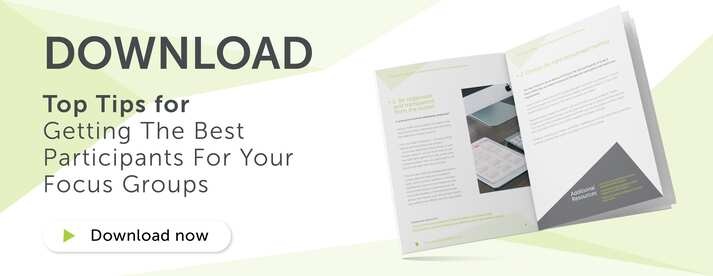
Face-to-face vs remote focus groups: which should you use when?
Focus groups have reigned supreme in market research for nearly 100 years now.
In fact, if you want to get to grips with what your customers think, deliver useful truths, and access insights to make informed decisions, you can’t go far wrong with a focus group.
But with both online and face-to-face focus groups having pros and cons, which approach is right for you, and which should you use when?
The lowdown on focus groups
So, what are focus groups, exactly? An essential part of the qualitative market research toolkit, focus groups involve carrying out research with a small group of people so you can get to know what they think and feel - and why.
Conducting research in these small groups enables you to really understand what makes people tick and access in-depth insights (so long as you recruit the right people for your research!)
But what about the difference between the two types of focus groups? Well, no prizes for guessing, face-to-face focus groups are carried out in person, whereas remote focus groups are conducted online with participants usually joining via their laptop, mobile, or tablet.
Read on to discover the pros and cons of online and face-to-face methodologies and how to choose which to use when…
Face-to-face versus remote: which to use when
The advantages of face-to-face focus groups
You can build a rapport with your participants
Kicking things off with good old-fashioned face-to-face focus groups, one of the biggest benefits of traditional focus groups is that they encourage a good rapport within the group and with the moderators.
Sometimes there’s no substitute for research being carried out in the flesh! It’s much easier to build a relationship based on genuine human interaction, and the more trust your respondents have in you, the more open and honest they will be - which means better insights for you.
You can access in-depth insights
Building a rapport between the moderator and respondents also enables the moderator to probe and dig deeper. Essentially, being in the same room at the same time means that they can read the situation better, allowing them to ask the right questions at the right time to unlock the best possible insights.
Plus, in person, it’s easier for participants and moderators to see reactions and read body language which, in turn, can make the participants more engaged.
They are participant led
Face-to-face focus groups also tend to be much more participant led. Unlike their online counterparts which often need to be steered by the moderator, conversation tends to flow much more naturally with face-to-face focus groups.
Respondents are more receptive and responsive to each other’s ideas, and, as such, moderators don’t need to prompt as much - which in turn leads to genuine, honest insights.
Participants can complete tasks
Face-to-face focus groups are also a favourable methodology if your research needs participants to complete physical tasks. For example, if they need to test physical products to determine usability, or even undertake taste tests, it’s much easier to do so in a face-to-face setting.
The disadvantages of face-to-face focus groups
They can be more expensive
Of course, there are some negatives to traditional face-to-face focus groups - and without a doubt, one of the biggest downsides of traditional face-to-face groups are the costs involved.
From the researcher’s perspective, they will need to hire a venue, allow for travel costs and/or parking, and provide refreshments. Plus, you will usually need to offer a higher incentive to make up for the time and cost of respondents travelling to take part.
They can be time-consuming
As opposed to the instant nature of online methodologies, traditional focus groups can be more time consuming, too.
For starters, before the research even begins, being restricted to a specific location can have a significant impact on recruitment time. You’ll also need to juggle the diaries of everyone involved, and after the focus group has been completed there is often a longer time lapse on recordings and transcriptions to allow for, too.
They aren’t always accessible
Accessibility is essential to market research. After all, if you are going to get a true representation of your customers, your research needs to be accessible to everyone - and unfortunately, this is one of the places where face-to-face focus groups fall down.
Not all venues are accessible to people with a disability, which means it a bigger challenge to ensure that research remains inclusive. This, along with people cancelling due to the location and travel time, can lead to more dropouts.
Respondents might be more guarded
Some people are more likely to be shy and reserved in a face-to-face setting. After all, it’s human nature to be wary of what others think about you. Plus, if you have a mix of personalities in your focus group, those with strong personalities could end up dominating the conversation.
This means that some respondents might feel that they can’t be as open and honest about their feelings in a face-to-face group as they would be online - which means it can be harder for the moderator to warm people up, break down barriers, and encourage everyone to open up.

The advantages of remote focus groups
You can reach a wider sample
Without a doubt, one of the biggest advantages of online methodologies is that you aren’t tied down by things such as geographical considerations, travel time, and small sample sizes.
Practically speaking, you will be able to access a wide range of participants from a variety of locations and demographics - making it easier to ensure your sample is truly representative of your customer base.
They’re faster
Another benefit of remote focus groups is that they are faster overall. From the beginning, recruitment can often be quicker as you have a UK-wide pool of respondents to target rather than specific locations.
Online focus groups are quicker and easier to arrange, too, because timings can be more flexible to suit respondents’ schedules and there’s more scope for daytime slots to be filled.
It’s also quicker and easier for participants to take part in online focus groups once they’ve been scheduled too. All they need is a working internet connection and they are good to go! That means there’s no need to send moderators up and down the country, or match diaries up to venue availability - which will save you a great deal of time and money.
Finally, once the research is complete, online focus groups are much quicker to record, rewatch, and transcribe.
They are more accessible
Remote focus groups are also easily accessible for everyone, which allows for those with physical impairments to participate from the comfort of their own home without the unnecessary travel to a venue. As such, you can reach all of your target audience and get a true representation of your customer base.
They are cost effective
Another big advantage of remoted focus groups is that they are generally less expensive to carry out. For starters, you don’t have to worry about the expense of hiring a venue or be concerned with travel costs.
Not only that, but recruitment costs can be lower for remote focus groups too because you aren’t restricted to a certain location – which means your recruitment pool will be larger, and sourcing high-quality participants will be easier and cost effective.
Respondents are less inhibited
Finally, although you don’t have to benefit of face-to-face interaction with a remote focus group, this could actually work in your favour. In fact, taking part online means people can benefit from emotional - as well as physical - distance from other respondents, which might make them feel less inhibited.
Research has shown that people can be more confident sharing their opinions online rather than in person - which could mean you end up with more honest insights, too. Plus, because people are taking part at home where they feel comfortable, it will likely encourage them to speak more freely, too.
The disadvantages of remote focus groups
Technology can go wrong
Due to the coronavirus pandemic, increased exposure to online methodologies has meant a significant reduction in tech issues. Basically, more and more people are used to software such as Zoom and Teams - which means that online methodologies are running more smoothly than ever before.
However, despite this, no matter how many tech checks you undertake, there is the possibility of last-minute tech issues. that the platform you are using could crash mid discussion. As a result, the flow of the conversation could be interrupted, which means insights could be lost - and respondents could even end up dropping out.
It’s harder to build a rapport
Another downside of online focus groups is that they can also be a little tricker for rapport building, which means that the session could end up being slightly more moderator led.
Plus, it’s also easier for people to become distracted if they are taking part in an online study rather than having a face-to-face conversation - which could have a knock-on effect on the quality of your insights.
So, which type of focus group is right for me?
In the wake of the COVID-19 pandemic where online focus groups were very much in favour, we are seeing more face-to-face focus groups taking place again now. So, how do you choose? Well, the right choice will most likely depend on a range of factors, including sample size, feasibility, budget, timelines, and the objective of your research.
However, with pros and cons to both methodologies, many brands are adopting a hybrid approach. By using a blend of the two methodologies - depending on the study and the type of outcomes you are helping to achieve - you can get the best of both worlds and ensure you access the best possible insights from your research project.
Need help recruiting awesome respondents for your next focus groups?
Whether remote or face-to-face, if you are recruiting participants for your next focus group, we’re here to help. After all, wherever approach you decide to take, to generate the best insights you need to recruit the high-quality, enthusiastic participants to begin with - and that’s where we come in!
Here at Angelfish, we have years of experience in recruiting exceptional participants for our clients’ focus groups over the years. From help with screeners to feasibility advice and more, we’re here to help ensure your market research recruitment is a success - so why not get in touch to find out more?





.png?width=500&name=Untitled%20design%20(4).png)

-Jun-11-2025-03-32-03-9584-PM.png?width=500&name=Untitled%20design%20(3)-Jun-11-2025-03-32-03-9584-PM.png)






